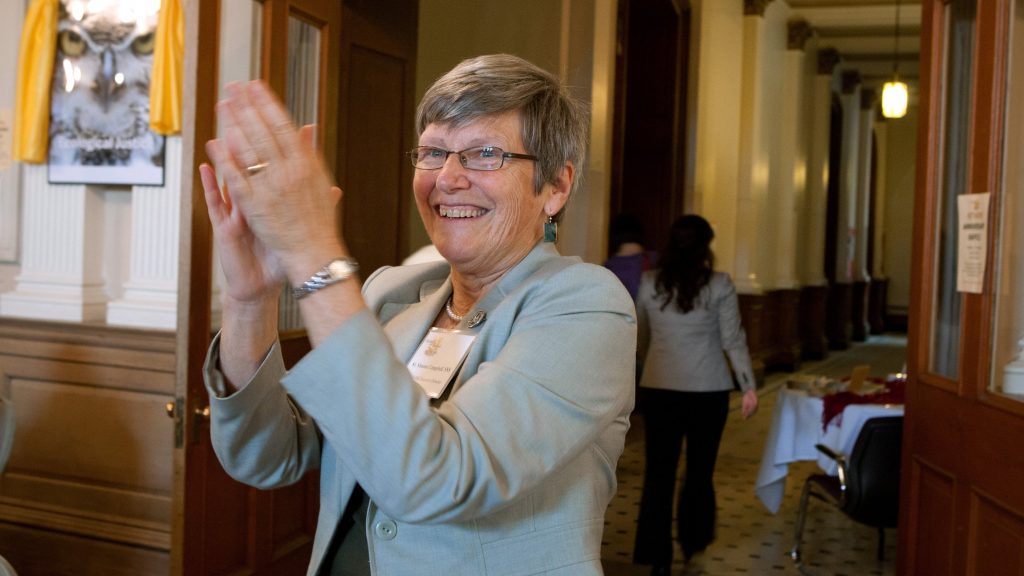As a third grader at St. Bartholomew School in Long Beach, California, young Mary Campbell wondered why her teacher almost always chose her and a few others to answer questions in class, largely ignoring others.
"He didn't call on everybody," recalled that girl who today is Sister Simone Campbell. "He just called on a few, including me, people who knew the answer. I didn't think that was fair. I didn't think that was right."
So she acted. She wrote a Thanksgiving play and gave everyone in her class a part. That way, she thought, no one would be overlooked.
Encouraging inclusiveness has guided the life of Sister Campbell, a Sister of Social Service and executive director of Network, a Catholic social justice lobby organization.
Whether it was as an attorney founding the Community Law Center in Oakland, California, in 1978 to serve low-income clients, leading a series of cross-country Nuns on the Bus tours or advocating on Capitol Hill for just policies on behalf of marginalized people, Sister Campbell has endeavored to ensure the voices of the overlooked are heard.
"Network's mission is to educate, organize and lobby. The education activates folks and gets people engaged," Sister Campbell told Catholic News Service.
Sister Campbell, 75, will step down from Network in the latter part of March after having headed the organization since 2004 and led it through a period of growth, rising nationwide visibility and wide recognition as a credible, consistent voice for justice.
"I believe that for an organization to continue to grow and flourish, new leadership is a good idea," she told CNS.
Under Sister Campbell's leadership, Network also has strengthened its relationships with Democratic and Republican members of Congress.
"Network is viewed as a very strong partner, a good advocate who crosses the aisle, that we're mission driven and not political," she said.
Behind those efforts is a unwavering adherence to Gospel values, Sister Campbell said.
The organization over the years also has built broad partnerships with labor, advocacy organizations for low-income people and interfaith groups to tackle issues of mutual concern. Sister Campbell said such relationships are crucial to achieving justice for all.
Sister Mary Beth Hamm, who chairs the board of Network Advocates, one of two operations under the lobby's banner, described Sister Campbell as a person who is willing to take risks to achieve the common good and remain faithful to the Gospel.
"She is so creative. She is a strategic thinker and she is a such a passionate and articulate messenger of the Gospel mandate to care for the poor and marginalized," Sister Hamm, a member of the Sisters of St. Joseph of Chestnut Hill in Philadelphia, told CNS.
Sister Campbell is especially gratified to have developed strong working relationships with congressional leaders, particularly House Speaker Nancy Pelosi, D-California, as well as with President Joe Biden, who as vice president in 2014 joined a leg of a Nuns on the Bus tour in Iowa.
Pelosi was in her first stint as House speaker in 2010 when Sister Campbell sent her a letter explaining that passage of the Patient Protection and Affordable Care Act was a just action according to the Gospel mandate of serving the common good. The law passed, opening access to health insurance for millions of uninsured people.
The law included a provision that required insurance providers enrolled under it to pay for contraceptives, a point that prevented the U.S. Conference of Catholic Bishops from supporting it. However, Sister Campbell said that despite the law's inclusion of contraceptive coverage, she believed it was vital that access to health insurance be extended.
Sister Campbell said she sees her work over the years as being led by the Holy Spirit. She said she often undertakes a pastoral approach in her work to overcome differences on policy, both among fellow advocates and on Capitol Hill.
The seven Nuns on the Bus tours since 2012 gave Sister Campbell and Network's staff the opportunity to hear from people on the federal budget priorities, immigration reform, tax fairness, poverty, affordable housing and needs in rural communities. They gave people the chance to tell their stories, and Sister Campbell used those stories to illustrate the impact of public policy on people's lives when she returned to Washington.
The tours, Sister Campbell said, also offered the opportunity to highlight some of the good things women religious are doing across the country in serving people, teaching children or offering a compassionate ear.
In the immediate future, Sister Campbell will take some time off to pray and discern what her next step will be. She plans to stay in Washington -- for now.
Almost certainly though, she said, her next step will involve listening and giving voice to people.

